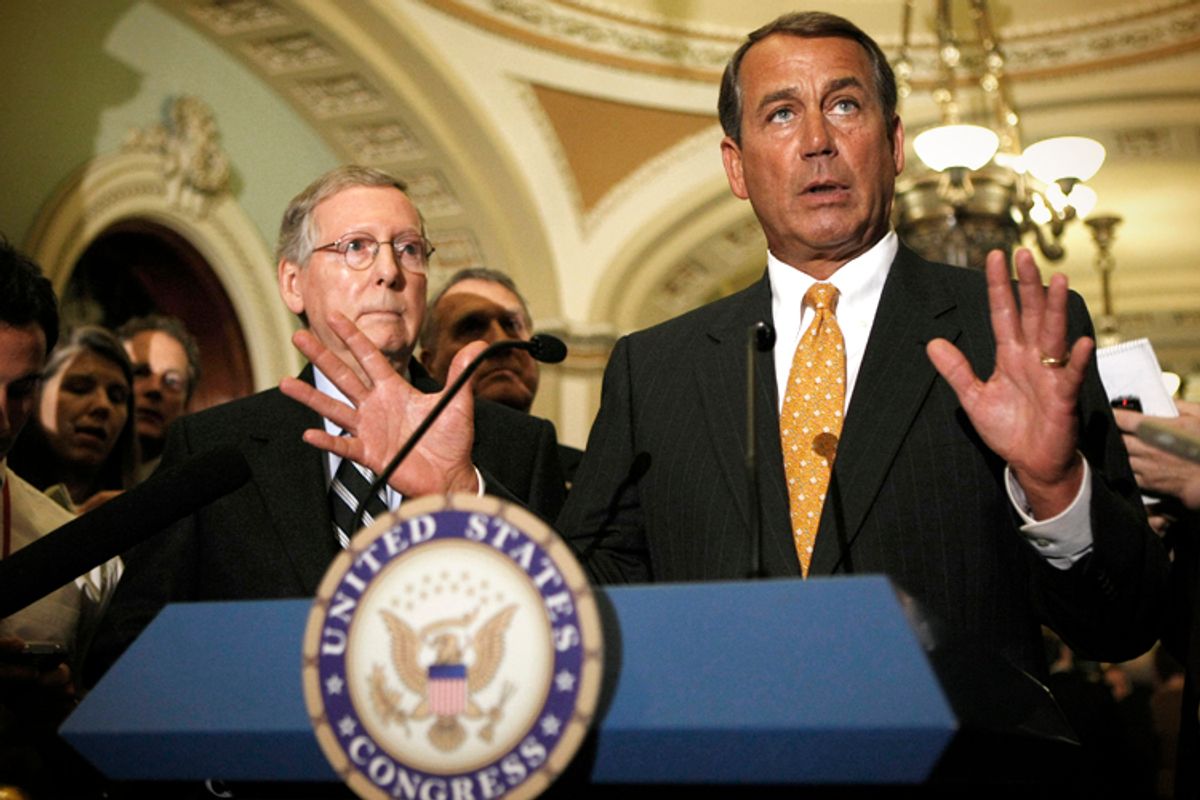One of the things that the incoming GOP Congress claims to be interested in pursuing is tax reform. One of the things that congressional Democrats claim to be interested in pursuing is tax reform. One of the things that President Obama claims to be interested in pursuing is tax reform. Do you see what we see, reader? Each important party in Washington claims to be interested in pursuing tax reform! Perhaps, what with the shared interest and all, this is fertile territory for legislation. President Obama and the Democrats can achieve a significant legislative victory in the final quarter of this administration; Republicans can "show they can govern," a thing they may or may not need to do.
But there may be an early hitch in the operation. President Obama intends to take executive action on immigration, something that Republicans don't want him to do. The Washington Post reports that Republican senators are concerned that this "combative" action from the administration precludes any hope of achieving tax reform:
Obama has been promising to cut the nation’s corporate tax rate, the highest in the world, for nearly three years. And with a rash of companies moving abroad to escape U.S. taxes, many Republicans see action on that issue as critical to both the economy and their political fortunes in 2016, when more than 20 GOP senators will be up for reelection.
However, lawmakers say that instead of engaging with Republicans, Obama has provoked them on a range of issues, most explosively his threat to unilaterally halt deportations of millions of undocumented immigrants.
This is the sort of logic that gets a lot of very serious heads nodding together in Washington, even though it's not logic at all. Well, we were going to work on tax reform, but then the president did something we didn't like in an entire other area of policy, so we couldn't do it anymore. It's another iteration of "poisoning the well," or what one might call the Politics of Hurt Feelings.
Politicians don't have many feelings, is the thing. They famously lack traits common in human beings, such as feelings and emotions. The Politics of Hurt Feelings -- this one at 1600 Pennsylvania Avenue is being a real jerk with his executive actions so we're not going to talk to him anymore -- is always a cover for choosing not to make difficult policy decisions, in any arena.
Republican leaders have been saying most directly that if the mean bully Barack Obama pokes them in the eye with executive action on immigration, he will eliminate any chance of Congress taking up comprehensive immigration reform next year. At least here, everyone's in the same policy ballpark. But that still doesn't mean it makes any sense! There will be nothing in Obama's executive action that bars congressional Republicans from writing a comprehensive immigration reform bill. They don't want to do that, though, because immigration politics tend to expose divisions within the Republican Party. So in comes the trusty rigmarole about hurt feelings to save the day and provide cover for inaction.
As far as overhauling the tax code goes, it's about the hardest sort of legislation to do, which is why it hasn't been done in nearly 30 years. This problem is similar for reforming either the individual or corporate tax code. The idea in each case is that you can lower tax rates without losing revenue by eliminating "loopholes."
"Loophole" is a funny word. In this context, it falsely indicates that something has snuck its way into the tax code through oversight and simply needs to be weeded out. That's not the case. In the individual tax code, the meatiest "loopholes" are things like the non-taxation of employer-provided health benefits or the mortgage interest tax deduction. These may not be the best ways to go about making health or housing policy, but they sure are enjoyed by millions and millions of people who aren't interested in having them taken away. The corporate tax rate, meanwhile, is nominally 35 percent. But the effective tax rate -- what corporations actually pay after taking advantage of certain "loopholes" for which they've lobbied hard -- is closer to 13 percent. Say a bill was introduced that cut the corporate tax rate to 25 percent but wiped out all those "loopholes." Would the corporations that currently pay 13 (or zero) percent be interested in seeing their tax bills rise?
Republicans understand the political risks associated with tax reform. Instead of assuming those risks in order to achieve something, they may just want to bail. Hey, fair enough! It's not like salt-of-the-earth populist voters streamed into polling stations on Election Day demanding an immediate restructuring of corporate taxes.
But if they decide to put off tax reform because of its difficulty? Please, spare the sob story about how Obama hurt your feelings by deferring some deportations.

Shares